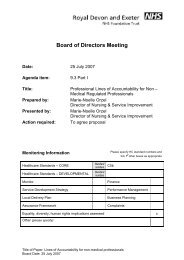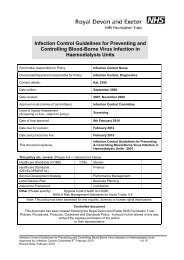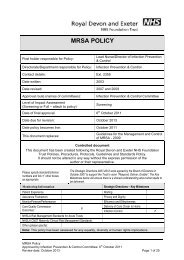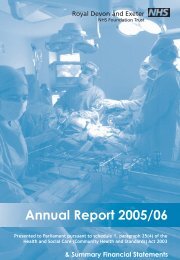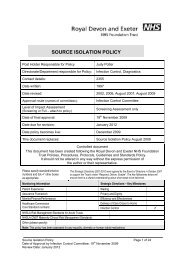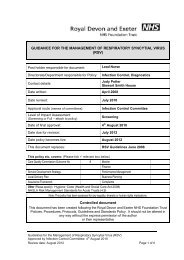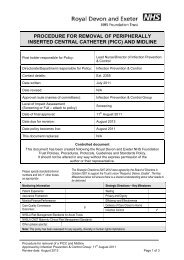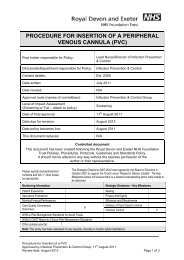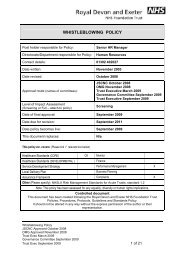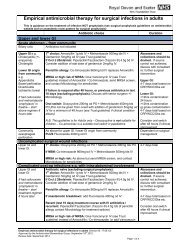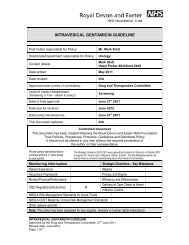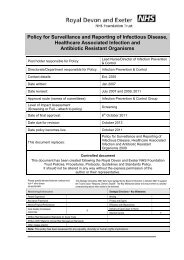Annual Report 2006/07 - Royal Devon & Exeter Hospital
Annual Report 2006/07 - Royal Devon & Exeter Hospital
Annual Report 2006/07 - Royal Devon & Exeter Hospital
Create successful ePaper yourself
Turn your PDF publications into a flip-book with our unique Google optimized e-Paper software.
<strong>Royal</strong> <strong>Devon</strong> & <strong>Exeter</strong> NHS Foundation Trust <strong>Annual</strong> <strong>Report</strong> <strong>2006</strong>/<strong>07</strong><br />
Behind the Scenes: HSDU<br />
Technology alone is not enough when<br />
it comes to the essential work of the<br />
<strong>Hospital</strong> Sterilisation and Decontamination<br />
Unit (HSDU). The fully-trained technicians<br />
must be conscientious and highly motivated<br />
to process and turn around 11,000 packs a<br />
week which come into the specialist unit for<br />
decontamination and sterilisation.<br />
This is a far cry from the pre-Second World<br />
War approach when nurses were expected to<br />
‘sterilise’ their own instruments, needles and<br />
syringes in boiling water!<br />
Today the HSDU technicians provide hospital<br />
wards and departments with all of the<br />
equipment and materials needed to carry out<br />
clean and sterile procedures.<br />
The trained eye of technicians enables them to<br />
spot damaged items, and they have an unrivalled<br />
knowledge of thousands of instruments across<br />
<br />
<br />
specialism they work in, such as cardiology, oral<br />
surgery or orthopaedics, but an HSDU technician<br />
knows all of the instruments – what they are,<br />
where they belong and what they should look<br />
like.<br />
All of the technicians rotate weekly between<br />
the different stages of the decontamination and<br />
sterilisation process.<br />
HSDU staff clean, sterilise and pack around 450<br />
theatre instrument sets a day – totalling 11,000<br />
per week!<br />
There’s a doctor with a difference at HSDU<br />
playing a crucial role in tracking the journey of<br />
every instrument or item used on a patient; Total<br />
Documentation, or ‘T-Doc’, is a computerised<br />
bar-coding system which gives each soiled or<br />
contaminated item coming into HSDU a unique<br />
number containing information on who packed,<br />
sterilised, despatched and returned the item and<br />
where it went when it left HSDU. This system<br />
<br />
its kind to be<br />
installed in this<br />
country.<br />
“We are serving the patients.<br />
You have to be eagle-eyed and never<br />
cut corners. It’s about taking pride<br />
in what you do and knowing that it<br />
is helping others – that’s what gives<br />
job satisfaction.”<br />
CLIVE WESTNEY, MANAGER, HSDU<br />
Layers of<br />
safeguard<br />
measures exist to<br />
help ensure that<br />
what leaves HSDU<br />
is ready to re-use,<br />
and an independent regulatory body makes<br />
six-monthly checks to ensure procedures are<br />
followed to the letter. Every three years<br />
the HSDU has to re-qualify for its quality<br />
accreditation ISO-9001/2000.<br />
Purpose-built for its specialist role at the RD&E<br />
in 1996, HSDU provides a round-the-clock service<br />
to the 19 operating theatres at the Wonford<br />
hospital site (including the Princess Elizabeth<br />
Orthopaedic Centre) and four theatres at<br />
Heavitree. It also serves the RD&E Emergency<br />
Department, outpatients departments and wards<br />
in <strong>Exeter</strong> and the community hospital theatres,<br />
as well as health centres including Axminster,<br />
Exmouth, Sidmouth, Tiverton, Honiton, Ottery<br />
St Mary, Crediton, Chagford and Okehampton.



